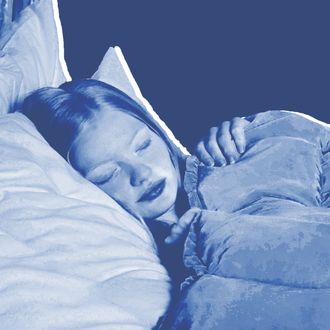
Sleep aids are a booming pharmaceutical niche sector that boasts memorable jingles and some of the most popular drug names around: Ambien, Lunesta, Belsomra. Belsomra is the newest of these, approved by the Food and Drug Administration in August 2014. And it was this drug that recently piqued researchers’ interest, because of the unique way it acts in the brain. It’s an “orexin-receptor antagonist,” which targets orexin, a signal that tells your brain to keep you awake. The medication acts by prohibiting orexin from sending the wakefulness signal, prompting you to fall asleep much faster than you would if left to your own devices — at least, theoretically.
But research commissioned by Consumer Reports citing Dartmouth Medical College’s Lisa Schwartz and Steven Woloshin — summarized recently again in the Huffington Post — indicates that while Belsomra purports to extend your snooze time, it just barely delivers. Individuals who were given a 15-milligram or 20-milligram dose of the drug nightly for three months fell asleep only six minutes quicker than those taking a placebo pill, and stayed asleep just 16 minutes longer. Schwartz was part of a panel commissioned by the FDA to look into the effects of Belsomra; that group found that people taking Belsomra were asleep for six hours and 12 minutes total on average — less than 20 minutes more than the placebo group.
Why not just take a higher dosage of the pill? Turns out Belsomra has some not-so-fun side effects, like being so drowsy the next day that participants failed a driving test. And so, overall, this drug might be one worth skipping. “It might help you nod off a few minutes faster or stay asleep slightly longer,” notes the Consumer Reports piece, titled “Here’s Why You Can Skip the New Insomnia Drug, Belsomra.” “But that small benefit comes with some big safety concerns, such as being too drowsy to drive the next day or feeling like you can’t move or talk.”
Alternative advice for those suffering from insomnia: Medical experts suggest that rather than spending money on sleeping drugs that offer practically no ZZZs for your hard-earned bucks, try some time-tested methods, like exercising right before bed, avoiding vino, and investing in some light-blocking curtains and earplugs. For more persistent, serious cases, experts suggest cognitive behavioral therapy. Beats getting less than 20 minutes extra sleep from a pill.




